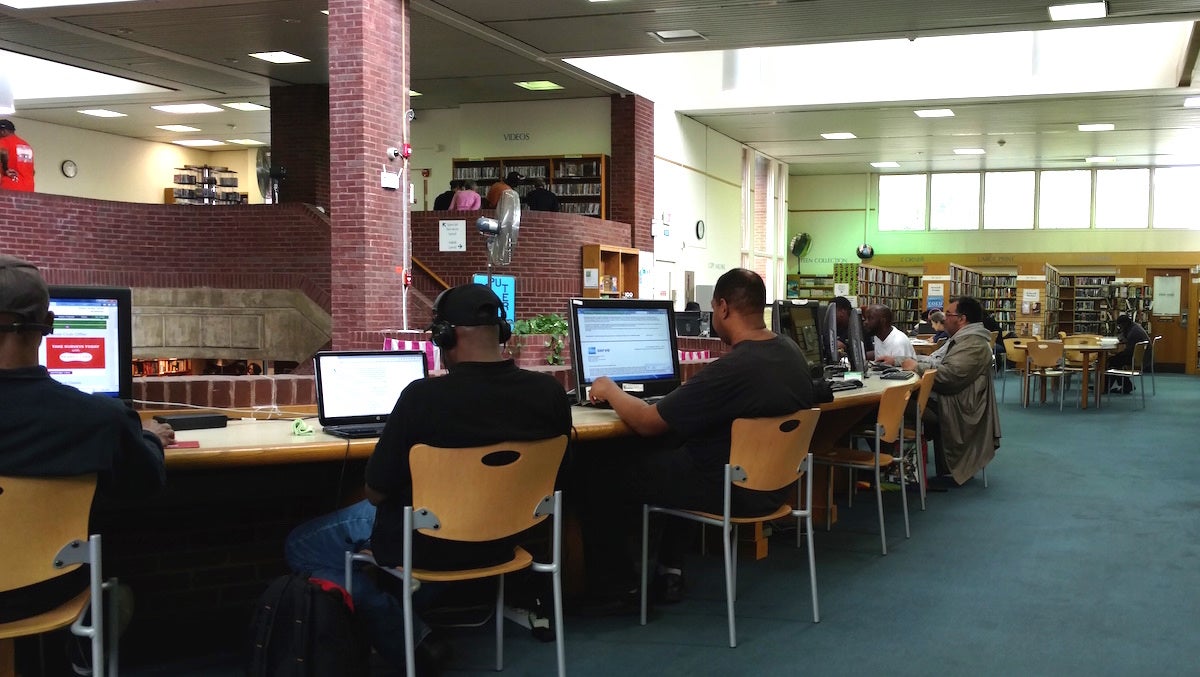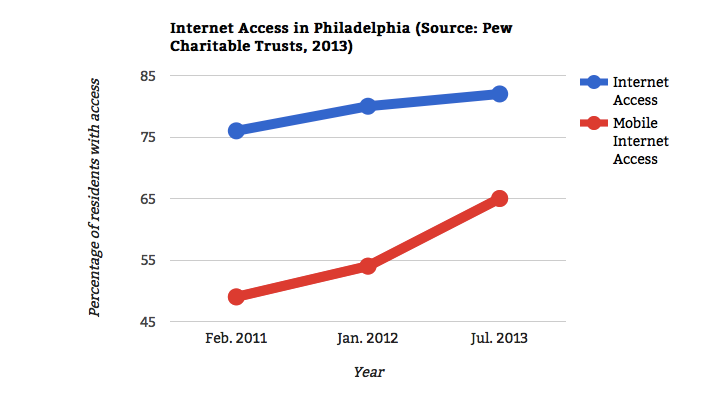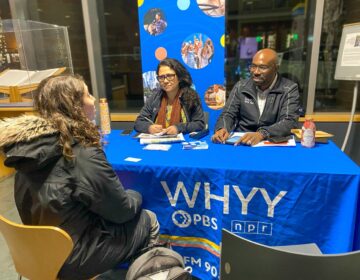Working to delete Germantown’s digital divide

(Eddie Dunn and Steve Graham/for Germantown Beat)
More than 100,000 of Philadelphia’s 1.5 million residents can’t afford internet access.
The figure, based on a 2013 study by the Pew Charitable Trusts, reflects the “digital divide,” the term used to distinguish those with computers and internet access, and those without — mostly people with incomes under $30,000 a year.
“Luckily I have the means,” said Lorelei Narvaja, a longtime advocate for digital literacy and chief strategist for Phildelphia Fight, a nonprofit advocacy group. “I could not imagine being a single parent, having several children, a household to take care of, all this stuff, and still, on top of that not being able to help my kids with their homework because I can’t afford to get good, quality internet in the home.”
While low-incomers tend to have cellphones, many lack personal computers at home and the resources to pay for internet access, which can cost as much as $100 a month.
Bridging the gap
But the digital divide in Philadelphia and in neighborhoods like Germantown is beginning to be bridged. Among the changes: a new program providing free wireless internet at several recreation centers in Germantown; expansion of Comcast’s “Internet Essentials” program; a new neighborhood restaurant offering free wireless; and increased access to computers at the Joseph E. Coleman Northwest Regional Library.
Betsy Baxter, a supervisor for the adult/teen department at the library, plays an important role in combating digital illiteracy. Her job: to help visitors on the library’s computers with any troubles they may have.
“Sometimes the assistance is basic, like how to make a reservation or how to print paper out. I assist with technical problems or troubleshooting . . . Most of the day, all of the computers are taken,” said Baxter, who believes the library computers are constantly being used because many Germantown residents cannot afford a computer.
Comcast steps up
It’s an issue that technology companies, including Comcast, are trying to address. With headquarters in Center City, Comcast recently expanded its “Internet Essentials” program, which offers affordable internet access for low-income households. Initially, Internet Essentials was only available for households with children who qualified for free or reduced lunch. But it became an option for poor households without children and for low-income senior citizens following a franchise agreement with the city earlier this year.
“In today’s digital world, Internet access is essential to succeed in areas of education, employment, healthcare and more,” said Karima Zedan, director of Internet Essentials. “Internet Essentials is Comcast’s signature community investment priority designed to help close the digital divide. It is about transforming lives and empowering communities, like greater Philadelphia, through technology and innovation.”
Low cost, high speed
For a $9.95 per month fee, the program offers free online classes and tutorials on how to safely browse the internet and provides internet access in the form of 10 megabit-per-second Wi-Fi.
Comcast declined to disclose how many new subscribers it has signed up since Internet Essentials was expanded four months ago. But experts outside the firm lauded the effort.
“Internet Essentials is great because it offers affordable access,” said Harry Fishburn, a digital literacy specialist for the Free Library of Philadelphia. “For the program to help eliminate the digital divide, we must urge people to purchase that service.”
Fishburn’s team, along with the city of Philadelphia, has tackled the city’s technology gap by developing a program called Keyspot. This citywide initiative is a partnership of community organizations that works to provide free internet access, training and technology to the greater Philadelphia area.
Internet at Germantown rec centers
“This is one of the most creative things the city has ever done,” said Andrew Buss, director of innovation for the city government.
There are 51 Keyspot sites throughout Philadelphia. According to Buss, the program is approaching 900,000 visits to the community facilities for internet access. Several can be found in Germantown, including the Happy Hallow Recreation Center, Mallery Recreation Center and the Waterview Recreation Center.
While the millennial generation has kept up with the growth of technology, many adults and senior citizens have not. According to Pew’s 2013 study, 94 percent of Philadelphians aged 18 to 34 have internet access. By contrast, only 54 percent of city residents over the age of 65 have access. For adults overall, the figure is 82 percent, up from 76 percent in 2011.
“Young people, in general, are pretty adaptable,” said Narvaja, of Philadelphia Fight. “Older adults tend to be more resistant to newer technologies.”
Aside from government-backed programs aimed at eliminating the digital divide in Germantown and other areas of the city, a few members of Germantown’s business community are also helping to bridge the gap.
The Happy Bread Cafe, located at the corner of Germantown and Chelten Avenues, offers free wireless with the hope that customers will use it for their benefit, which in turn will ideally help the family-run business and community.
Coffee and resume-writing
“That’s what we built it for. For the community to have their meetings in here and buy a cup of coffee,” said Ique Alexander, whose family owns the cafe. “If you spend five hours in here and work on your resume, then that’s beautiful. Hopefully, [customers] go out there and get a job, then spend their money here.”
Increased access to computers and the internet has begun to pay off for some local residents.
Phillip Davis, 52, is currently seeking a position as a forklift operator after many years in the field. As technology has advanced, so too has the need for forklift operators to be able to operate that technology.
“I had zero computer literacy skills. My grandson did everything for me,” said Davis, a resident of Germantown. “The hardest part about getting a job for me was the computer.”
Recently, however, Davis got help from Molly Van Den Heuvel, a digital resource specialist at the regional library in Germantown.
“Molly helped me make a resume, and showed me how to use the internet,” said Davis as he printed out his resume. “Before this help, I would come in and pay people to do this work for me. I asked people with laptops, because I figured if you had a laptop, then you know what you’re doing.”
Van Den Heuvel works in the computer lab in the basement of the library. Here, she helps Germantown residents job hunt and learn basic computer skills.
Davis is a frequent visitor to this library, which has several computers scattered throughout its three floors with internet access, printing and scanning capabilities.
“I’m ready for this job,” said Davis. “The forklifts have computers in them, and I’m confident I can work them.”
A ways to go
For the digital divide to truly be eliminated, experts say that both government and the private sector need to step up their commitment to low-income residents and to the concept that digital information is as necessary as electricity and water.
“I think that the digital divide can be closer to becoming more abridged if internet access (is) seen as a public utility rather than this luxury that you pay for if you have enough money,” said Narvaja. “Having heat for your home or running water … I would argue that internet access is starting to get to that status too.”
Germantown Beat is a website produced by student journalists at La Salle University.
WHYY is your source for fact-based, in-depth journalism and information. As a nonprofit organization, we rely on financial support from readers like you. Please give today.




